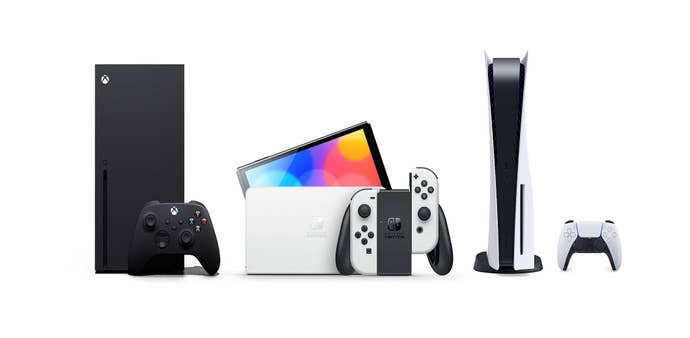FTC seeks to block Microsoft from acquiring Activision Blizzard alleging it will suppress competition
It believes the acquisition would give Microsoft the "means and motive to harm competition."
The Federal Trade Commission (FTC) is seeking to block Microsoft from acquiring Activision Blizzard.
An independent agency of the US government, the FTC alleges the $69 billion deal would enable Microsoft to suppress competitors to its Xbox gaming consoles.
In a complaint issued December 8, the FTC pointed to Microsoft’s "record of acquiring and using valuable gaming content to suppress competition from rival consoles." The agency specifically called out Microsoft's acquisition of ZeniMax, Bethesda's parent company, and the decision to make some of the studio's titles exclusive to PC and Xbox. This was done "despite assurances" Microsoft gave to European antitrust authorities that it had "no incentive to withhold games from rival consoles," calling out Starfield and Redfall specifically.
“Microsoft has already shown that it can and will withhold content from its gaming rivals,” said Holly Vedova, director of the FTC’s Bureau of Competition. “Today we seek to stop Microsoft from gaining control over a leading independent game studio and using it to harm competition in multiple dynamic and fast-growing gaming markets.”
Last year, Microsoft revealed "some" of Bethesda's new titles will be exclusives, but it never stated whether or not the games would eventually come to PlayStation or Switch down the road. And the company never outright said "all games" would be kept off rival systems. This is where the FTC is a bit off.
Microsoft never really "assured" the European Commission Bethesda and other Zenimax titles would not be exclusives. In fact, the statement made to the commission was that future decisions on whether to distribute Zenimax games for other consoles will be "made on a case-by-case basis," taking into account player demand and sentiment. Factors that will inform Microsoft’s decision-making on future games include both consumer demand and preference, plus the "willingness of third parties to work with Microsoft to launch games for their devices." That would put the ball in Sony and Nintendo's court.
Furthermore, when Microsoft announced that Starfield and Redfall will only be released on Xbox and PC, the announcement was in line with statements it made upon the close of the ZeniMax transaction. It also reiterated that "some new titles in the future" will be exclusive to Xbox and PC players, not all titles.
As far as Call of Duty and Blizzard games are concerned, like Bethesda games, Microsoft has said repeatedly it does not plan to make any existing games exclusive to Xbox. This includes the Call of Duty franchise which Microsoft has, again repeatedly, stated will not be kept off PlayStation platforms, and has even offered a deal to bring the series to Switch and keep it on PlayStation for at least 10 years.
As it relates to Call of Duty, the FTC is worried that should the acquisition proceed, with control over Activision’s blockbuster franchises, Microsoft would have "both the means and motive to harm competition." The commission feels the company will do this by "manipulating pricing, degrading Activision’s game quality or player experience on rival consoles, changing the terms and timing of access to Activision’s content, or withholding content from competitors entirely."
So, does this mean the deal is dead in the water? Not just yet. The commission only issues an administrative complaint when it has “reason to believe” that the law has been or is being violated. The issuance of the administrative complaint marks the beginning of a proceeding in which the allegations will be tried in a formal hearing before an administrative law judge.

In response to the FTC's planned lawsuit to block the merger, Activision Blizzard CEO Bobby Kotick stated that while the commission's move sounds "alarming," he believes the deal will close.
"The allegation that this deal is anti-competitive doesn't align with the facts, and we believe we’ll win this challenge," Kotick stated. "The competitive landscape is shifting, and, simply put, a combined Microsoft-ABK will be good for players, good for employees, good for competition, and good for the industry.
"We believe these arguments will win despite a regulatory environment focused on ideology and misconceptions about the tech industry."
The Communications Workers of America (CWA), a Labor Union that represents the communications and information industries, news media, and others, had this to say about the FTC's lawsuit.
"By moving to file a lawsuit in administrative court to block Microsoft’s acquisition of Activision Blizzard, the Federal Trade Commission has missed an opportunity to demonstrate that it takes the labor impact of mergers seriously.
"Instead, the FTC has once again focused its analysis solely on consumer harms and, in this case, console-market leader Sony’s concerns about increased competition."
The CWA feels the acquisition would be good for workers currently with Activision Blizzard, as it stated the company is against workers' organizing efforts to freely and fairly organize a union. When Microsoft announced it was to acquire the company, it agreed to enter into negotiations to show regulators good faith efforts to address monopsony harms, which resulted in a legally binding agreement with CWA.
CWA said that approving the merger with the labor agreement with Microsoft in place will "send a game-changing message to corporate America that workers do indeed have a seat at the table, that their concerns matter, and must be addressed."
"We believe the FTC’s case is not likely to convince a federal judge, particularly as the European Commission may move to approve the deal, and that workers at Activision Blizzard will finally have the opportunity to improve their wages, benefits and working conditions through their union."
While Microsoft had hoped to close the deal by the end of its fiscal year in July 2023, the FTC has scheduled a hearing to take place before an administrative law judge for August 2023.
We'll keep our eyes on the situation as it progresses.








.jpg?width=291&height=164&fit=crop&quality=80&format=jpg&auto=webp)
